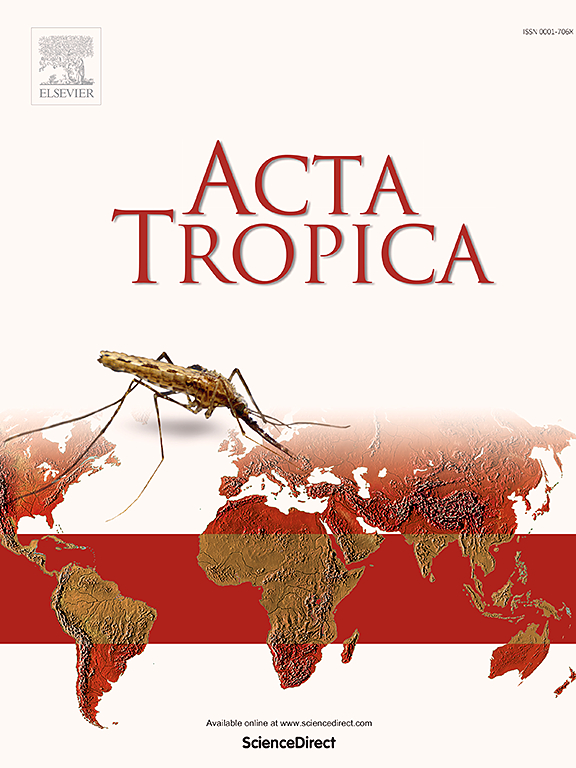阿根廷温带地区冬季自然条件下埃及伊蚊的未成年存活率和雌性寿命。
IF 2.1
3区 医学
Q2 PARASITOLOGY
引用次数: 0
摘要
在阿根廷温带地区,对埃及伊蚊在冬季自然营养和热条件下的表现进行了评价。未成熟阶段以落叶为食物来源饲养。饲养分为三个队列,第一组在深秋开始,第二组在初冬开始,最后一组在仲冬开始,每个队列中根据日照(阳光和阴凉处)安排两个处理。试验期间的月平均气温为7月的10.1℃~ 10月上旬的14.3℃。实验中生存率较低(平均16.2%),冬季中期生存率最高(33%)。从1龄幼虫到成虫羽化的发育时间在24 ~ 103 d之间,受种群、处理及其交互作用的影响,与温度呈反比关系,特别是在阳光处理下。中冬和晚秋日照组的个体发育时间较短。成虫寿命很低,仅受性别影响,雌性成虫寿命(4.5天)高于雄性成虫寿命(3.1天)。这项工作的结果表明,在温带的阿根廷,尽管未成熟的阶段可能在冬季完成发育并达到成年阶段,但雌性可能无法存活足够长的时间来成功繁殖。本文章由计算机程序翻译,如有差异,请以英文原文为准。

Immature survival and female longevity of Aedes aegypti under natural winter conditions in the temperate region of Argentina
The performance of Aedes aegypti was evaluated under natural winter nutritional and thermal conditions in the temperate region of Argentina. Immature stages were reared using leaf litter as a food source. The rearing was structured in three cohorts, the first started in late-fall, the second in early-winter and the last in mid-winter, and in each cohort two treatments were arranged according to solar exposure (sun and shade). The mean monthly temperature during the experiment ranged from 10.1 °C in July to 14.3 °C in the early days of October. Survival in the experiment was low (average 16.2 %), with a maximum (33 %) in mid-winter cohort. Development time from first instar larva to adult emergence varied between 24 and 103 days, was affected by cohort, treatment and their interaction, and showed an inverse relationship with temperature, particularly in the sun treatment. Individuals from the sun treatments of mid-winter and late-fall cohorts had shorter development times. Adult longevity was very low and was only affected by sex, being higher in females (4.5 days) than in males (3.1 days). The results of this work suggest that although immature stages may complete their development and reach the adult stage during the winter in temperate Argentina, females may not survive long enough to reproduce successfully.
求助全文
通过发布文献求助,成功后即可免费获取论文全文。
去求助
来源期刊

Acta tropica
医学-寄生虫学
CiteScore
5.40
自引率
11.10%
发文量
383
审稿时长
37 days
期刊介绍:
Acta Tropica, is an international journal on infectious diseases that covers public health sciences and biomedical research with particular emphasis on topics relevant to human and animal health in the tropics and the subtropics.
 求助内容:
求助内容: 应助结果提醒方式:
应助结果提醒方式:


